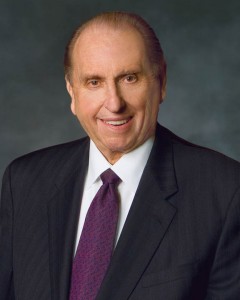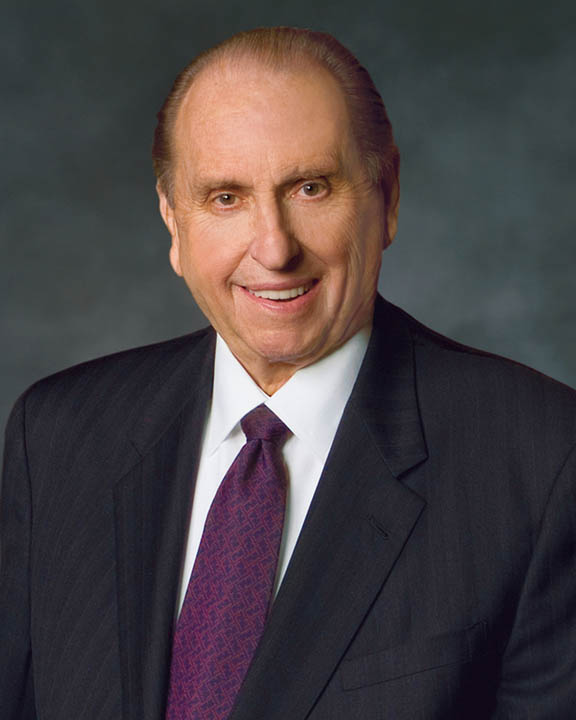Saturday, February 9, 2008 was momentous for members of the Mormon Church. First, it was the first time that the church membership in general was invited to attend a worldwide leadership training broadcast. Since the subject was on families, the church felt that all members needed to hear the counsel and principles that were being taught.
 Second, it was the first time that Thomas S. Monson addressed the church in his new capacity as president. For Mormons, this is like hearing a new president give his inaugural address or first state of the union speech, or a new pope giving his first Urbi et Orbi address. Even though President Monson has been in the first presidency (the supreme governing council of the church) since 1985, there was still anticipation and excitement for his new role.
Second, it was the first time that Thomas S. Monson addressed the church in his new capacity as president. For Mormons, this is like hearing a new president give his inaugural address or first state of the union speech, or a new pope giving his first Urbi et Orbi address. Even though President Monson has been in the first presidency (the supreme governing council of the church) since 1985, there was still anticipation and excitement for his new role.
In his sermon, President Monson suggested three practical things we can do to strengthen our families:
1. Develop a pattern of prayer.
2. Build a library of learning.
3. Leave a legacy of love.
I will focus on the second point, the home library. This idea is not new to Mormonism. Joseph Smith, the founding Mormon prophet, received a revelation that, in part, said:
“And as all have not faith, seek ye diligently and teach one another words of wisdom; yea, seek ye out of the best books words of wisdom; seek learning, even by study and also by faith.” (D&C 88:118)
Of course the best books would include The Good Book, and all of the scriptures. We all could use more scripture study, and have more exposure to the ancient wisdom, the lessons of history, and the prophetic insight that the scriptures contain. Also, we need to brush up on the Life of Jesus Christ. We should be as familiar with the life of Jesus Christ as we are with our own lives.
While J. K. Rowling was still writing, we would hear about the reading binges and marathons that would happen with each new Harry Potter book. But I would always wonder if these same children approached scripture study with the same passion and vigor. I would also wonder if they knew the life of the Savior as well as they knew the life of Harry, Hermione, and Ron. Reading is a pleasure, but there needs be priorities.
There is also another point. Dr. Hugh W. Nibley noted that this commandment to read is open-ended:
“We are to ‘teach one another…learning even by study and also by faith.’ And from what sources? Out of the best books? Where is the list? Why no syllabus? Because we are to do the seeking. It is we who must decide which are the best books and to do that we must to ‘prove all things [and] hold fast to that which is good’ (1 Thessalonians 5:21). We must make our own syllabus as part of organizing ourselves and preparing ‘every needful thing.’” (Hugh W. Nibley, A House of Glory)
This is part of Christian Liberty that I love. God gives us the freedom of initiative in many things, including the selection of our reading material. The Mormon Church has no “banned book list.” We just have this general counsel: “If there is anything virtuous, lovely, or of good report or praiseworthy, we seek after these things.” (Articles of Faith 13). We can make up our own minds about what is and is not good.
But what is The Good?
The Book of Mormon, which is another testament of Jesus Christ comparable to the Bible, gives us this answer:
“For behold, my brethren, it is given unto you to judge, that ye may know good from evil; and the way to judge is as plain, that ye may know with a perfect knowledge, as the daylight is from the dark night.”
“For behold, the Spirit of Christ is given to every man, that he may know good from evil; wherefore, I show unto you the way to judge; for every thing which inviteth to do good, and to persuade to believe in Christ, is sent forth by the power and gift of Christ; wherefore ye may know with a perfect knowledge it is of God.”
“But whatsoever thing persuadeth men to do evil, and believe not in Christ, and deny him, and serve not God, then ye may know with a perfect knowledge it is of the devil; for after this manner doth the devil work, for he persuadeth no man to do good, no, not one; neither do his angels; neither do they who subject themselves unto him.”
“And now, my brethren, seeing that ye know the light by which ye may judge, which light is the light of Christ, see that ye do not judge wrongfully; for with that same judgment which ye judge ye shall also be judged.”
“Wherefore, I beseech of you, brethren, that ye should search diligently in the light of Christ that ye may know good from evil; and if ye will lay hold upon every good thing, and condemn it not, ye certainly will be a child of Christ.” (Moroni 7:15-19)
What is The Good? Simple: The Good is Christ. This is why we need to go back to the scriptures. They give us an accurate idea about Christ. He is our model, our example, and our guide. We need to ask ourselves “What Would Jesus Do?” and then do it. The only way we know what Jesus would do is by studying what He actually did. Then we simply apply the principles to our situation.
The counsel from President Monson and the revelation from Joseph Smith makes no distinction between fiction and nonfiction, technical books, philosophy, poetry, romance, science fiction, fantasy, and so forth. It is an open-ended invitation to adventure.
My parents, for example, are constantly devouring mystery novels. I think it strengthens their marriage to be reading the same books. It gives them something to talk about, and is a unifying hobby.
President Monson’s counsel was to read good books. But there is also an implicit counsel: we need to write good books. Before a person can read a good book, someone has to write a good book. People with the ability, drive, know-how, and passion for writing need to step forward and begin typing.
This, of course, is a proactive way of dealing with the problem of bad media.
As we said earlier, Christ is The Good. But I do not think that writing a good book involves perpetually biographizing the Savior. In the case of fiction, I think it involves having Christic characters, or people who are mini-Christs in the story. Looking for Christic characters in stories is also a way to judge if the book is good. A good book would essentially be ethical, with the conflict being about choosing to follow Christ, or choosing to be a half-hearted follower or a semi-Christian.
Imagine a 100% Christian and a 99% Christian debating on a course of action. That 1% makes all the difference in the world! Of course there are infinite possibilities, but the core must be Christ.
Orson F. Whitney, an apostle in the Mormon Church once said of the Mormons:
“We will yet have Miltons and Shakespeares of our own. God’s ammunition is not exhausted. His brightest spirits are held in reserve for the latter times. In God’s name and by His help we will build up a literature whose top shall touch heaven, though its foundations may now be low in earth. … Small things are the seeds of great things, and, like the acorn that brings forth the oak, or the snow-flake that forms the avalanche, God’s kingdom will grow, and on wings of light and power soar to the summit of its destiny.” (June 3, 1888. Collected Discourses, volume 1)
That is something to strive for. If we read good books, or feel the call of God to write good books, we can do good. Either way, the world will be a better place for our trying.
About kendalbhunter
Twitter •


